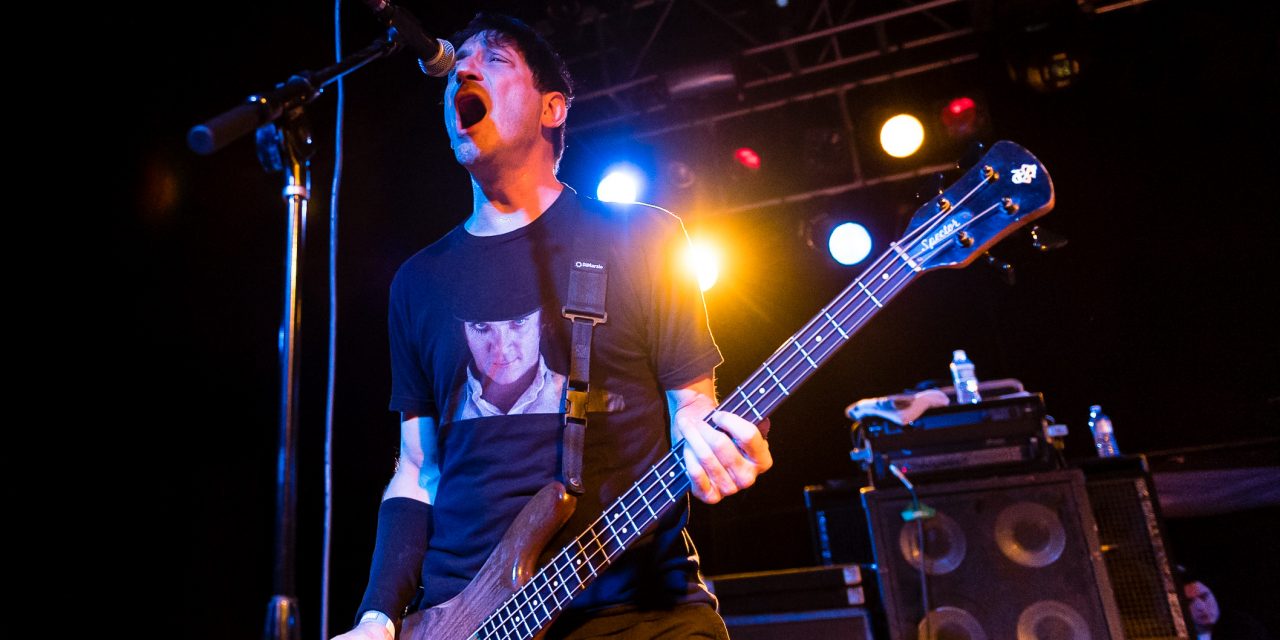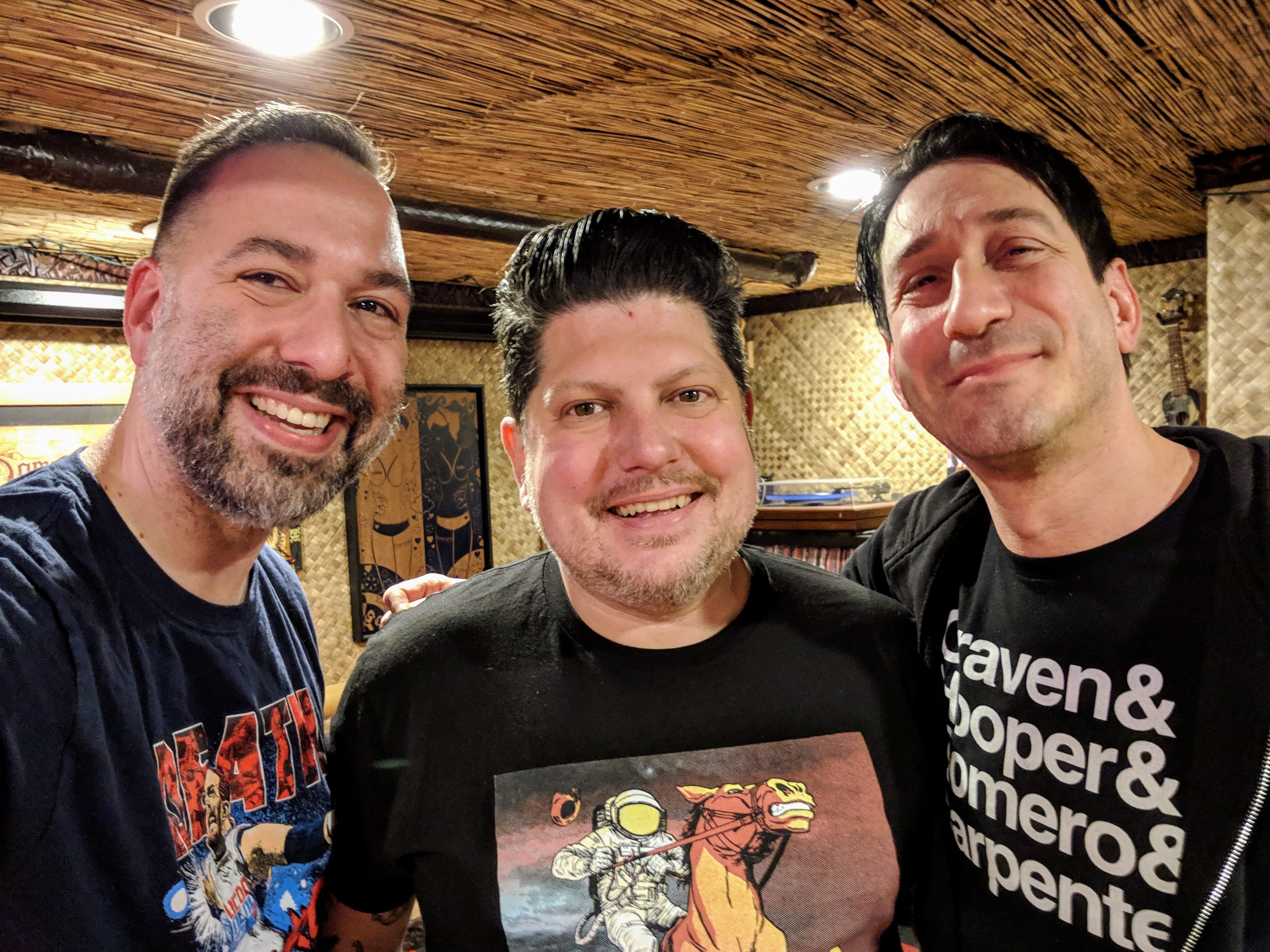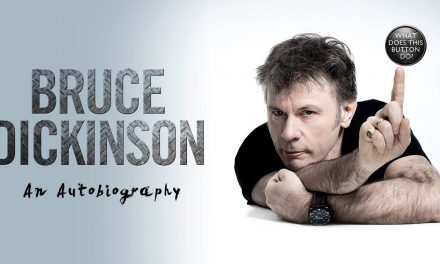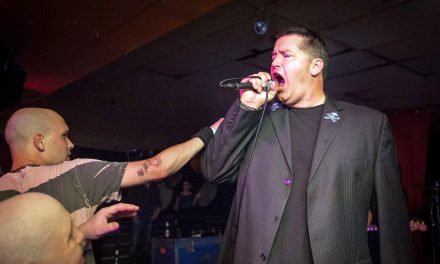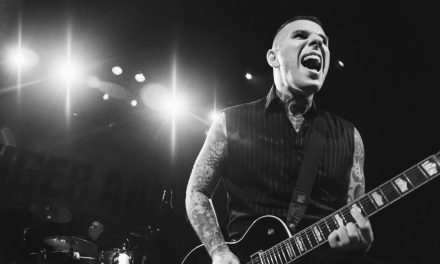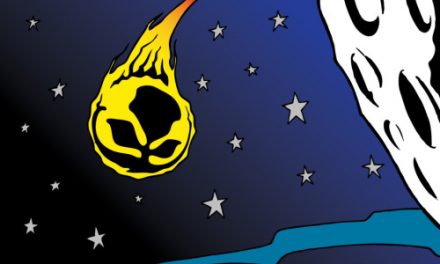Dave Neabore is a co-founder and bassist of legendary hardcore outfit Dog Eat Dog and has played bass in the group since its conception in the early ’90s. He’s also a huge horror movie aficionado, having written and directed seven short films, and has crafted numerous horror soundtracks over the last few decades. Dave stopped by the Headhunter’s Lounge to talk to us about what Dog Eat Dog has been up to, what it’s like to be in a band for three decades and his love for the macabre.
George: Thanks for joining us in our tiki lounge. What have you up to these days?
Dave Neabore: Dog Eat Dog is still making new music. Our new EP comes out November 30 with worldwide distribution thanks to our new label, Flying Dolphin/Metalville. We were on Roadrunner Records for so many years, and it started out great. During out biggest period, Roadrunner was there for us, but at the end, a lot of staff changed and we got forgotten about. We weren’t really happy with our previous experience, so we were reluctant to sign with another label, but Metalville made us a great offer and said all the right things.
George: I feel like hardcore bands on Roadrunner in the mid-’90s got the Slipknot Shuffle. Bands like Madball and Shelter got lost when nu-metal became popular.
Hambone: I think that had more to do with the Universal/Vendi shake up. At the time, a lot of labels were getting acquired and labels were going out of business. I was an intern for A&M Records and I really wanted a job but they weren’t hiring, because they didn’t know what was going on with the label. A lot of smaller labels, and larger labels with small footprints, got eaten up.
Dave Neabore: That’s what happened to us. In 2002, Warner Bros and Roadrunner merged and we were in the middle of it and that’s when we got off the label.
George: I was at a work event earlier tonight and I told my co-workers that I had to leave early to interview the bass player of Dog Eat Dog, and every male colleague over the age of 40 lit up. Everyone under 33 had no idea what I was talking about. One of my directors pulled out his phone and fired up “No Fronts” and started talking about how ahead of its time Dog Eat Dog was and my younger colleagues were very impressed. People shouldn’t forget that Dog Eat Dog was right there with Rage Against the Machine and Downset, blending hip hop and hardcore way before it became a thing.
Dave Neabore: In Europe, it was called Crossover. Everything with hip-hop vocals over heavy music was called crossover.
George: Pardon my genre ignorance. Most underground rock fans from the ’90s know All Boro Kings, your legendary record featuring groundbreaking songs like “Who’s the King,” “No Fronts” and “If These are Good Times.” After that you released Play Games and then you basically disappeared from the States and became huge overseas. I’d like to know what happened to Dog Eat Dog after you left America.
Dave Neabore: The sequence of events was this: When All Boro Kings came out, we went to Europe with Biohazard. That was spring into summer of 1994. Biohazard were peaking at that time and we were playing to sold out audiences every night and killing it. By the time that tour ended, every metal and hard rock fan in Europe had seen Dog Eat Dog play. Then we got a slot on the Dynamo Festival in Holland in front of 120,000 people, and it was basically the pinnacle for bands like Downset, Biohazard, Life of Agony, Type O Negative — we all played this festival and it was the ’90s in a time capsule. We did something that hadn’t been seen before — we couldn’t even believe the reaction.
The next thing that happened was that MTV played us so heavily and we ended up winning a MTV award in 1995 in Europe, beating Alanis Morissette, Weezer and Portishead for best new breakthrough artist. After that, the next record, Play Games, came out and it was huge in Europe. We tried to play shows in the U.S. in 1995 and went on tour with 311 and No Doubt and we played a few more shows with Biohazard in 1996, but mostly we stayed in Europe and played everywhere there.
It took us three years to come out with another record, and by the time that record came out, we had waited way too long. Our audience changed a lot between 1994 and 1996. Even in that short period, we went from playing to hardcore skateboard street kids to — by late ’96 — we were playing in front of teeny bopper girls. We were so overplayed on MTV that Dog Eat Dog was beyond the control of the original fans any more. Then there was a little bit of a backlash in Europe where we had to lay low for a minute.
That said, if you wait long enough, everything comes back. And eventually, everything did come back for us. In the last four years, things have been getting better and better. Our core audience is still there and now they have kids that are 20 years old and they are coming to our shows. We have have two generations of fans sitting in front of us and that’s pretty incredible. Even at our low point, we continued and played our best and here we are, 28 years later.
Hambone: It’s really interesting that when the crossover scene died over here, a lot of bands went to Europe where they still like music and aren’t as fickle as the American audience. They like a band and stick to their guns. I think that gives a band more time to plant roots into a scene.
Dave Neabore: I absolutely agree and proof of that is we just did six shows with Limp Bizkit in Germany where they are huge. I know they are still known around the world and sold 40 million records, but I had no idea just how big they were. They called us and we played in front of seven to ten thousand people a night.
I think an underground band has a much bigger chance of making it in Europe. Their club system and promotion is as good as America or better. I’m seeing a lot of bands in the U.S. struggling and I’m seeing a lot of bands there putting out records and touring a lot. Even a smaller band can set up a string of shows and tour. When they love a band in Europe, they love you unconditionally. Metal bands from 35 years ago are still packing clubs there.
George: Sadly, you killed my joke question about if you could go back in time would you tell your younger self not to play rap rock because it would inspire a generation of Limp Bizkits. But since you are playing with them…
Dave Neabore: Honestly, it was a really great experience playing with them because their audience is perfect for us. They accept hip hop and hard rock, so they already like that kind of sound. None of the young people knew who Dog Eat Dog was, but they accepted us and liked us and we sold a lot of shirts and made a lot of new fans. It was perfect, because we weren’t getting booed off stage or getting shit thrown at us.
George: The first time I ever saw Dog Eat Dog was part of the strangest bills I had ever seen. It was at the Irving Plaza on December 21, 1995. It was a Christmas show featuring Shelter, Dog Eat Dog, Weston, H2O and Vision of Disorder.
Dave Neabore: Not only do I remember that show perfectly, but it was immortalized on Friends. There’s an episode called “The One with the Donor” and there’s poster for that show in the background. It’s all over the internet if you look it up. The funny thing is that the show was in 1995 but the episode was made in 2001.
George: I remember that show was tough to get to and it was really cold out and the line-up was so strange. It personified what was so great about the punk scene in 1995. You could go to a backyard shows and see hardcore bands and pop punk bands and rockabilly bands all playing together and there was never any weirdness. I remember Toby from H2O at the show, coming out in a Santa outfit, on a sleigh with the rest of the band carrying him like reindeer. It was a surreal night.
Dave Neabore: Shelter was the headliner. Howie Abrams signed Dog Eat Dog to Roadrunner and he also signed VOD and Shelter. So, we basically had three Roadrunner bands playing together, because they were all associated with Howie. H2O was friends with everybody. I’m not sure how Weston ended up on that bill.
Hambone: I love Weston, but in 1995 they were just about to release Got Beat Up. They must have gone over like a fart in church.
George: No. No. It worked. That whole show worked.
Dave Neabore: I’m pretty sure they went on first.
George: Weston was huge in the area at that time.
Hambone: Yeah, but kids like me would have been in a wildly different audience than say VOD fans.
Dave Neabore: Even Dog Eat Dog being on that show was kind of weird. It was definitely a good mix of very different kinds of people. I mean Shelter fans are not necessarily Weston fans, but everyone can be together. That was the incredible thing about the scene, especially in the ’90s. Music got so mixed up in terms of genres, but everyone seemed to like everything at the time.
George: Most of the photos I have of you from that time were from August 1996 at the WSOU 10th anniversary show. It’s crazy to think that SOU was only a decade old at the time. You’d think that station had been around since the dawn of time. It was a very hardcore heavy show.
Dave Neabore: The line-up for that show was legendary. If you look back, every band on it had a record out or were well known. We were low on the bill and I was happy to be on the line-up at the time, but I look at the ad now and I’m blown away by how great of a bill it was.
George: It was strange seeing Fear Factory and Overkill playing along side H2O, Orange 9mm and The Misfits.
Dave Neabore: That’s what Europe was like at the time. It was a taste of what was going on over there. All those bands together.
George: Talk to me about Play Games. I know that was a controversial album, but “Rocky” is an awesome song.
Dave Neabore: That was my nickname. I came up with this idea for a song and I came to practice earlier than the singer and showed the band the ideas with me singing. It just turned into the one song with me on lead vocals. It wasn’t a planned thing, but it turned into a hit song and one that we play on every show to this day. Just this morning, I saw a video on Instagram of a young child dancing and singing along to “Rocky” and it made me feel really great. That’s what I’m talking about. This kid’s father must love us and played the song so many times that the kid knows it.
George: You just wrapped up a few shows in Greece. What’s that crowd like? I know they love metal there and Thessaloniki is the hipster capital of that country.
Dave Neabore: I agree. I was in Athens and then went to Thessaloniki and I like the Northern feel a little more. The culture is more mixed — there’s Czech bars and cool stuff. Athens is great too, but the show we played up North was a big festival event. The Athens show was put together because we wanted to play a little club while we were there.
George: So, what does the near future hold for Dog Eat Dog?
Dave Neabore: We recently made an EP and released it on our own. Metalville heard it, liked it and wanted to re-release it properly. The only time anyone bought the EP was at our shows, so it was more of a fan thing. Now it’s going to be in stores and distributed by Rough Trade. We also tried some unplugged shows for the first time in our career. It’s kind of a rush playing with no distortion and still trying to get energy out of it and the crowd reacted well. We are putting three of those songs on the b-side of the EP. It’s coming out on green vinyl and we are contracted for a full length that we are just about knee deep in. We’ve written songs already, performed a bunch live and are about halfway through writing it. We still have all of 2019 to write and record the record, which we are doing in Switzerland.
George: Any plans to re-release the old Roadrunner albums properly? Maybe on vinyl?
Dave Neabore: They all came out on vinyl originally. I don’t even have the Amped record on vinyl. Here’s the problem. We asked our new label to try to find out who has the rights to our old records. To get off Roadrunner, we had to give them the rights to everything, but it’s been 20 years and no one works at Roadrunner that was there at that time. We can’t figure out how to make it work, but we have people on it. Next year is the twenty-fifth anniversary of All Boro Kings and to do a special vinyl with a gatefold cover, splatter disc and pictures no one has ever seen would be my dream. The problem is, you don’t want to put it out and then have people from another company suing you for releasing something illegally. You have to have the rights and we don’t know exactly know how to go about doing that.
George: I’m still trying to find that hardcore album you put out late in your career. I think it was the album after Amped, but I could be wrong.
Dave Neabore: That was a different band called All Boro Kings, which released a hardcore album in 2002 with Jimmy from Murphy’s Law on guest vocals. Basically, it was what should have been the follow up to the album All Boro Kings, instead of Play Games. We went back and gave the fans what they thought they were going to get and I really wanted to make that record too. The All Boro Kings Just for the Fun of It record is probably my favorite record that I ever made. It was so fast and fun to write with no rules. We were signed to Century Media Records and they let us do whatever we wanted.
George: Real talk. I knew of All Boro Kings, but I always thought they were band named after the Dog Eat Dog album as sort of a homage. Kind of like Against the Grain. I didn’t realize it was a super group.
Dave Neabore: We wanted to do it as a Dog Eat Dog recording. We were asked to contribute two songs to a record and the problem was that [Dog Eat Dog singer] John Connor couldn’t make it and we wrote the songs without him. We couldn’t call it Dog Eat Dog without John, so we called it All Boro Kings because it was the thing most closely associated with Dog Eat Dog at the time. It was a one off; we toured Europe with Agnostic Front and Biohazard and that was it. We all moved on.
George: Do you think if you had kept the hardcore sound of your earlier records, you would have been more accepted by the hardcore fans in America?
Dave Neabore: We started as a band that was really accepted in the New York hardcore scene. All those bands — Sick of it All, H2O, Agnostic Front — these are bands that still have our back. Two months ago, we played This is Hardcore in Philly and it was a really incredible feeling to be asked to play that show, because it means that the old fans still believe in the old hardcore songs. We played nothing but tracks from ’93 and ’94 and gave everyone what they wanted. We are doing two more of those shows in New Jersey and Queens and then slowly mixing in some more melodic songs into the set to see what happens.
George: Switching gears, let’s talk about horror and your passion for the macabre. Why did you decide to make your own horror movies?
Dave Neabore: I’ve always been interested in composing soundtracks, but I didn’t know anyone that was making any movies at the time. So I decided that if I made some movies, then I could make soundtracks for them. That’s what pushed me to do that. Dog Eat Dog and had a little extra income — this was in ’99 — and I had been writing scripts with a friend and wanted do a full-length feature. Then I realized that there was no way I could do it, so we started doing short films. I decided to make shorts for a decade just to see what happens.
That decade came and went and I made a whole bunch of short films and I realized that there isn’t a whole lot of ways to make money with them. It’s a passion project that’s fun to do, but there isn’t a lot of payback if you work on a film for months, put it on YouTube and only a thousand people watch it. It came down to, was this worth doing? One day I’m going to go back to short films, but right now things with music are going really well for me. I’m going to call that 10-year period of short films my film school. I learned how to shoot, how to edit, I learned a lot and I can apply that to my dream of making a full-length feature one day.
Hambone: How cool is it that now when you go back to filmmaking, technology will be what it is and the ability to create and distribute films is night and day from what it was when you started making independent movies.
Dave Neabore: Absolutely. The technology is through the roof. People that I worked with on my movies back then are now advanced in the film industry, and there’s a lot of perks I can get and connections that I already have. One day it will all work out for me. I’m sure it’s my destiny – even if it’s the last thing I ever do — to make a full-length movie. For now, the band thing has been steadily getting better and even if I wanted to make short films, I don’t have the time to do them.
George: You said you made movies to make horror soundtracks. Are you still doing horror soundtracks?
Dave Neabore: I did the soundtracks to all my short films except one. Then a friend of mine made a feature film and he asked me to make the opening title sequence to his movie. I was also asked to do the soundtrack to a documentary called Lucio Fulci Remembered Vol. 1 that features interviews with everyone that worked with [director Lucio] Fulci. The guy who directed the documentary said he heard the work I did on A Symphony of Fear and wanted me to do that for his movie. It was five songs and came out really well and I was really excited about making it.
Years later, the comic book company Eibon Press called and said they loved the soundtrack I did for the Fulci movie and were interested in having me do soundtracks for their horror comic books. Basically, every project I did led to another project. There’s no plan to continue making soundtracks, but it’s nice to know that people hear them, like them and trust me enough to come in and do more. I’m about to go into the studio and start a new record based on soundtrack music that influenced me — John Carpenter, Goblin, Tangerine Dream. Now I have the freedom, technology and producer to finally go in and make this album that I’ve wanted to make for a long time.
This interview was edited for readability and to protect the innocent. You can listen to the original conversation on Mai Tai Happy Hour #91.

